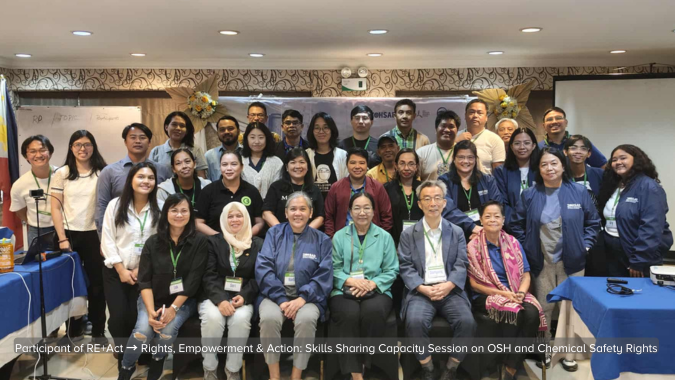Last Friday, September 16th, a group of NGOs from Northeast Asia and the Special Rapporteur on Hazardous Substances and Wastes held a panel discussion during the 33rd session of the UN Human Rights Council in Geneva. They discussed cases of mismanagement of hazardous substances by transnational corporations which have resulted in human rights violations, including affecting the health and safety of workers and communities.
The event was organized by Supporters for the Health and Rights of People in the Semiconductor Industry (SHARPS) and Labor Action China (LAC), both members of GoodElectronics Network. It was moderated by the Korea Center for United Nations Human Rights Policy (KOCUN) and supported by the International Service for Human Rights (ISHR). The panelists stressed that workers have a right to know to which chemicals they are being exposed and that such information should never be confidential as it is key for preventing human rights violations and to guarantee effective access to remedy.
UN Special Rapporteur critical on companies that expose workers to hazardous substances
Special Rapporteur Baskut Tuncak highlighted that, during his different country visits (including to South Korea), he has observed a widespread exposure of workers and communities (among them many children) to hazardous substances. This is a violation of their human rights. In South Korea, where he visited Samsung facilities, he witnessed the high vulnerability of workers due to their high rates of exposure. He further commented on how the right to information and the right to access to remedy are important in addressing human rights issues related to toxics. He stressed that there is currently a gross deficit in how businesses are assessing toxic exposure in their due diligence processes. He elaborated on principles relating to business accountability to victims, including compensation, as well as accountability to the broader society.
Chemical exposure cases in China
Jason Chan shared LAC’s work on Occupational Health and Safety issues, whereby they have documented a series of chemical exposure cases in China, including benzene poisoning. Due to a lack of information, victims are having serious problems in proving linkages between their illnesses and the chemicals they have been exposed to at work. This is aggravated by the fact that chemical poisoning has a long latency period, sometimes more than 10 years. Suppliers of electronics products are constantly employing workers under short term contracts. Therefore, when victims come to realize that they are victims of an occupational illness they have often already changed employers.
Chan stressed that, while prevention is very important, many employees are not given good protective equipment. LAC research has found out that workers don’t know to which chemicals they are being exposed as they are not properly labeled. For example, during interviews conducted by LAC, workers referred to substances as “banana water” due to its color and smell but not knowing exactly what it was. This situation violates the right to know. For those interested in learning more on the situation of chemical poisoning in China, Jason Chan invited attendees to read the recent research publication The Poisonous Pearl authored by LAC, LESN and SOMO and published by the GoodElectronics Network.
Death and diseases at Samsung factories in South Korea
Young Eun Kwon from SHARPS commented on the cases of workers in the semiconductor and LCD factories of Samsung Electronics who have been suffering from cancers and incurable illnesses that are suspected to be work-related. The number of workers’ illnesses and deaths from South Korea’s electronics industry documented by SHARPS is 368.
Kwon stressed that workers in Samsung semiconductor and LCD factories are kept from key data, violating their right to ‘access to information’ and ‘access to remedy’ as Samsung alleges that this information is subject to ‘trade secrets’. She demanded Samsung and South Korea’s government to responsibly address this issues and asked for a strong Human Rights Council recommendation. She closed stating that “full implementation of human rights principles would prevent this types of tragedies from happening in the future”.
UN mechanisms for reform and accountability
Sarah Brooks from ISHR delivered a presentation on using UN mechanisms for reform and accountability. She identified obstacles faced by defenders in seeking accountability at the local level, including the challenges of access to information, the challenge on holding corporations accountable and the limits faced by those individuals seeking to support victims and accountability in protecting human rights.
Challenge to the electronics industry
GoodElectronics Network coordinator, Alejandro Gonzalez, demanded that corporations provide full materials disclosure, including chemicals being used. He also referred to the Challenge to the Global electronics Industry regarding the use of chemicals which has been endorsed by over 200 organizations and individuals from more than 40 countries. He further stated: “Health and safety information on chemicals cannot be considered as confidential, not even alleging trade secrets. Companies must implement the UN Guiding Principles with particular attention to the impact of chemicals and governments must guarantee that victims have access to remedy and compensation”.
More information
- Report ’The Poisonous Pearl. Occupational chemical poisoning in the electronics industry in the Pearl River Delta, People’s Republic of China’.
- Report ‘Human rights Violations by Transnational Corporations: Mismanagement of Hazardous Substances. Voices from Northeast Asia’.
- The report of the Special Rapporteur on its mission to the Republic of Korea.
- The video of the side event.










